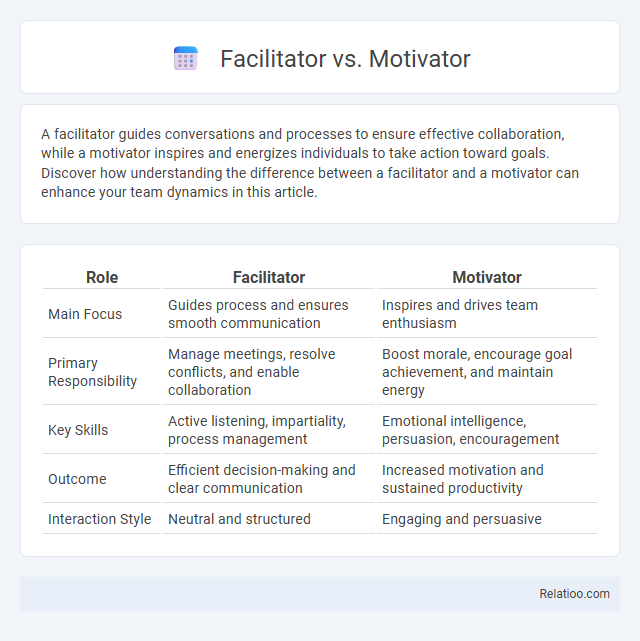A facilitator guides conversations and processes to ensure effective collaboration, while a motivator inspires and energizes individuals to take action toward goals. Discover how understanding the difference between a facilitator and a motivator can enhance your team dynamics in this article.
Table of Comparison
| Role | Facilitator | Motivator |
|---|---|---|
| Main Focus | Guides process and ensures smooth communication | Inspires and drives team enthusiasm |
| Primary Responsibility | Manage meetings, resolve conflicts, and enable collaboration | Boost morale, encourage goal achievement, and maintain energy |
| Key Skills | Active listening, impartiality, process management | Emotional intelligence, persuasion, encouragement |
| Outcome | Efficient decision-making and clear communication | Increased motivation and sustained productivity |
| Interaction Style | Neutral and structured | Engaging and persuasive |
Introduction to Facilitation and Motivation
Facilitation involves guiding group processes to enhance collaboration and ensure productive outcomes, while motivation centers on inspiring individuals to take action and achieve goals. As a facilitator, your role is to create an environment that supports open communication and problem-solving, whereas a motivator focuses on driving personal or team enthusiasm and commitment. Understanding the distinct dynamics of facilitation and motivation helps optimize group performance and individual engagement.
Defining the Role of a Facilitator
A facilitator guides group discussions and processes to ensure effective collaboration and goal achievement without imposing their own opinions. Your role as a facilitator is to create a neutral environment that encourages participation, active listening, and shared understanding among team members. Unlike motivators who inspire through encouragement or leaders who drive outcomes, facilitators focus on enabling the group's collective decision-making and problem-solving.
Understanding the Concept of a Motivator
A motivator is a key driving force that inspires and encourages individuals or teams to achieve their goals by tapping into intrinsic and extrinsic incentives. Unlike facilitators who primarily guide processes or create an enabling environment, motivators actively influence attitudes and behaviors to enhance performance and commitment. Understanding your motivator helps tailor strategies that align with your personal or organizational objectives, fostering sustained motivation and success.
Key Skills of an Effective Facilitator
An effective facilitator excels in active listening, clear communication, and conflict resolution to guide group discussions and ensure balanced participation. Unlike motivators who primarily inspire enthusiasm and drive, facilitators focus on creating an inclusive environment that fosters collaboration and consensus-building. Mastery in time management, neutral mediation, and adaptability enables facilitators to steer groups toward productive outcomes without imposing personal biases.
Essential Traits of a Successful Motivator
A successful motivator embodies essential traits such as empathy, strong communication skills, and the ability to inspire action by connecting with individual aspirations and values. Your role as a motivator requires fostering positive energy, setting clear goals, and maintaining consistency to encourage sustained motivation. Unlike facilitators who guide processes or general motivators who provide encouragement, a successful motivator drives change by aligning personal and organizational objectives effectively.
Facilitator vs Motivator: Core Differences
Facilitators guide group processes, ensuring effective communication and collaboration, while motivators inspire and encourage individuals to achieve goals through emotional influence. Facilitators create structures and environments that enable productivity, focusing on process management, whereas motivators emphasize driving internal drive and enthusiasm. Understanding the core difference lies in facilitation enhancing group dynamics and motivation energizing personal commitment and action.
When to Use Facilitation in Group Settings
Facilitation is essential in group settings when guiding discussions, resolving conflicts, or achieving consensus among diverse participants. You should use facilitation to create an inclusive environment that encourages equal participation and leverages collective intelligence. This approach differs from motivation, which is more about inspiring individual or group drive rather than managing the process of collaboration.
The Impact of Motivation on Team Performance
Motivation directly influences team performance by enhancing engagement, boosting productivity, and fostering collaboration among members. A facilitator creates an environment that supports communication and problem-solving, while a motivator actively inspires and energizes the team toward achieving goals. Understanding the distinct roles helps you harness motivation's impact to drive higher performance and achieve collective success.
Integrating Facilitation and Motivation for Success
Integrating facilitation and motivation enhances your leadership effectiveness by combining structured guidance with inspiring energy, driving teams toward shared goals. Facilitation ensures smooth collaboration and problem-solving, while motivation ignites passion and commitment, creating a balanced approach to achieving success. Leveraging both roles empowers your team to overcome obstacles and maintain momentum in complex projects.
Choosing the Right Approach: Facilitator or Motivator?
Choosing the right approach between facilitator and motivator depends on your team's needs and project goals; facilitators guide discussions and promote collaboration, while motivators inspire and drive individual enthusiasm. Your role as a leader should align with the context, emphasizing facilitation when fostering collective problem-solving and motivation when boosting personal engagement and productivity. Understanding these distinctions ensures you effectively support your team's dynamics and achieve optimal results.

Infographic: Facilitator vs Motivator
 relatioo.com
relatioo.com